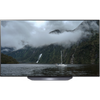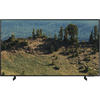A comparison of specs, key information, reviews, and best pricing from top retailers
Last updated -- hours ago | Report incorrect information
What we think

The PerfectRec TV team Learn more
Updated January 10, 2024·
The LG B1, being an OLED TV, offers better picture quality, especially in dark rooms due to its perfect black levels. It's great for movies, series, and gaming with low response time and input lag. However, it may not be as bright as LCD TVs and can be more expensive. The Samsung AU8000, an LCD TV, is more affordable and performs decently in bright rooms. It works well enough for news, talks, and cartoons, but its picture quality, especially in dark rooms and for sports, isn't as high as the LG B1. It also has slightly higher input lag which may not be ideal for gaming. Give Feedback
this description is based on the product variant with some specs and product variant with some specs. At the time of writing, the variant with some specs cost some dollars and the variant with some specs cost some dollars.
Advantages of the LG B1 (OLED)
- Good for bright room
- Very good for dark room
- Very good for gaming
- Very good for movies & TV
- Very good for sports
- Very good for news, talk, & other TV
- Very good for cartoons & animation
- Very good for use as monitor
- Very good for upscaling
- Very good motion processing
- Excellent viewing angle
- Excellent reflections
Advantages of the Samsung AU8000 (LCD)
- The Samsung AU8000 (LCD) has no clear advantages over the LG B1 (OLED).
Key differences
Picture Quality
8.4
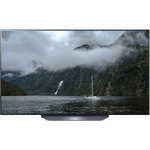
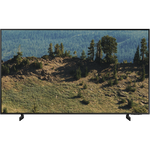
6.6
10.00/10
CONTRAST
6.71/10
7.1/10
COLOR VOLUME SCORE
6.3/10
WOLED
PANEL TYPE
LED
WBC
PANEL SUB-TYPE
VA
The LG B1 (OLED) has very good picture quality, while the Samsung AU8000 (LCD) has only fair picture quality.
Movies & TV
8.9


5.9
10.00/10
CONTRAST
6.71/10
10.0/10
BLACK UNIFORMITY
6.9/10
8.0/10
UPSCALING
7.5/10
Yes
HDR10 SUPPORT
Yes
No
HDR10+ SUPPORT
Yes
Yes
DOLBY VISION SUPPORT
No
The LG B1 (OLED) is very good for movies & TV, while the Samsung AU8000 (LCD) is poor.
Sports
8.3


6.5
8.0/10
MOTION PROCESSING
6.0/10
120Hz
REFRESH RATE
60Hz
8.0/10
INPUT LAG SCORE
10.0/10
8.0/10
UPSCALING
7.5/10
7.0/10
SDR BRIGHTNESS SCORE
7.1/10
Yes
HLG SUPPORT
Yes
The LG B1 (OLED) is very good for sports, while the Samsung AU8000 (LCD) is only fair.
The LG B1 OLED provides excellent motion processing and has a wide viewing angle which makes it a strong choice for watching sports; it also handles reflections well and has fast response time. On the flip side, the Samsung AU8000 LCD suffers in sports viewing with poor motion processing and a more limited viewing angle, and although it manages reflections adequately, its slower response time can lead to a less smooth experience.
Gaming
8.9


5.8
9.4/10
RESPONSE TIME SCORE
5.9/10
8.0/10
INPUT LAG SCORE
10.0/10
8.0/10
MOTION PROCESSING
6.0/10
100.0/100
GAMING LOCAL DIMMING
0.0/100
6.7/10
GAME HDR BRIGHTNESS SCORE
5.8/10
The LG B1 (OLED) is very good for gaming, while the Samsung AU8000 (LCD) is poor.
The LG B1 OLED offers excellent response time and very good input lag, making it very good for gaming, whereas the Samsung AU8000 LCD is rated poor in response time despite having the best input lag, which makes it less suitable for fast-paced gaming.
Cartoons & Animation
8.1


6.9
8.1/10
COLOR GAMUT SCORE
6.1/10
7.1/10
COLOR VOLUME SCORE
6.3/10
7.0/10
SDR BRIGHTNESS SCORE
7.1/10
7.1/10
COLORS OUT OF THE BOX SCORE
7.2/10
9.6/10
GRAY UNIFORMITY
6.8/10
The LG B1 (OLED) is very good for cartoons & animation, while the Samsung AU8000 (LCD) is only fair.
The LG B1 OLED delivers superior color performance right out of the box and has a very good color gamut which is why it's considered very good for watching cartoons and animation, whereas the Samsung AU8000 LCD's color performance is considered fair largely due to a more limited color gamut and volume which are crucial for animated content.
News, Talk, & Other TV
8.5


6.7
7.0/10
SDR BRIGHTNESS SCORE
7.1/10
8.0/10
UPSCALING
7.5/10
The LG B1 (OLED) is very good for news, talk, & other TV, while the Samsung AU8000 (LCD) is only fair.
The LG B1 has better upscaling and SDR brightness, which makes it very good for watching news and talk shows as it can make lower resolution content look sharper and performs well in typical lighting conditions. In contrast, the Samsung AU8000 is fair in this regard because while its upscaling is decent, the lack of local dimming and a lower contrast affects the picture quality, especially in very bright or dark scenes.
Bright Room
7.0


6.3
9.1/10
VIEWING ANGLE
5.5/10
7.0/10
SDR BRIGHTNESS SCORE
7.1/10
6.6/10
HDR BRIGHTNESS SCORE
5.7/10
9.2/10
REFLECTIONS SCORE
7.8/10
The LG B1 (OLED) is good for bright room, while the Samsung AU8000 (LCD) is only fair.
The LG B1 OLED has excellent reflection handling which makes it suitable for brighter rooms, unlike the Samsung AU8000 LCD which has good reflection handling but is less effective. Additionally, the LG's OLED technology offers perfect contrast and a wide color gamut, enhancing viewing in bright settings, whereas the Samsung's contrast and color volume are less impressive which may reduce picture quality in well-lit conditions.
Cost
$1,700


$648
$0
$500
$1,000
$1,500
$2,000
$2,500
$3,000
The LG B1 (OLED) has a price of $1,700 and the Samsung AU8000 (LCD) costs $648.
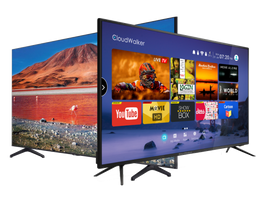
Let Us Help Find Your Perfect TV
Find your new TV
Give feedback
We’re constantly working to improve.
How the LG B1 (OLED) and the Samsung AU8000 (LCD) compare to other TVs
Spec Comparison
| LG B1 (OLED) | Samsung AU8000 (LCD) |
GENERAL | |||
|---|---|---|---|
| Price | |||
$1,700 | $648 | ||
Brand | |||
Brand | LG | Samsung | |
Release Date | |||
Release Date | March 2, 2021 | March 4, 2021 | |
Full name | |||
Full name | OLED65B1 | UN65AU8000 | |
Screen Size | |||
Screen Size | 65" | 65" | |
Screen Resolution | |||
Screen Resolution | 4K | 4K | |
TV FEATURES | |||
|---|---|---|---|
Operating System | |||
Operating System | webOS | Tizen | |
Sound Quality Score | |||
Sound Quality Score | 7.8/10 | 6/10 | |
NextGen Ready | |||
NextGen Ready | No | No | |
HDMI Ports | |||
HDMI Ports | 4 | 3 | |
Coax Ports | |||
Coax Ports | 1 | 1 | |
DISPLAY QUALITY SCORES | |||
|---|---|---|---|
Picture Quality Score | |||
Picture Quality Score | 8.4/10 | 6.6/10 | |
Bright Room Score | |||
Bright Room Score | 7/10 | 6.4/10 | |
Gaming Score | |||
Gaming Score | 8.9/10 | 5.8/10 | |
Movies & TV Score | |||
Movies & TV Score | 9/10 | 5.9/10 | |
Sports Score | |||
Sports Score | 8.3/10 | 6.5/10 | |
PHYSICAL | |||
|---|---|---|---|
Dimensions w/o Stand (H x W x D) | |||
Dimensions w/o Stand (H x W x D) | 32.7" x 57" x 1.8" | 32.7" x 57.1" x 1" | |
Dimensions with Stand (H x W) | |||
Dimensions with Stand (H x W) | 34.2" x 57" | 34.4" x 57.1" | |
Weight without Stand | |||
Weight without Stand | 52.9 lbs | 46.1 lbs | |
VESA Mount | |||
VESA Mount | 300 x 200 | 400 x 300 | |
DISPLAY | |||
|---|---|---|---|
Color Depth | |||
Color Depth | 10 bit | 10 bit | |
Black Frame Insertion | |||
Black Frame Insertion | Yes | Yes | |
Auto Low Latency Mode | |||
Auto Low Latency Mode | Yes | Yes | |
Contrast | |||
Contrast | 10/10 | 6.7/10 | |
Local Dimming | |||
Local Dimming | 10/10 | 2.5/10 | |
SOUND | |||
|---|---|---|---|
Speaker Setup | |||
Speaker Setup | 2.2 | 2.0 | |
Speaker Power | |||
Speaker Power | 40 W | 20 W | |
Dolby Atmos | |||
Dolby Atmos | Yes | Bypass only | |
DTS:X | |||
DTS:X | No | No | |
Shopping
Samsung AU8000 (LCD)
See more
Dig into reviews and images
USA Today
Michael Desjardin | April 2023
"To put it directly: you’d never see a mid-range 4K TV hitting this black levels half a decade ago. AU8000 plays the part of a higher-end TV thanks to its sleek design. If you’re upgrading to a smart TV for the first time, the software is a great way to dip your toes in the streaming water."
Get a great deal on the LG B1 (OLED) or the Samsung AU8000 (LCD)
About LG
LG, a prominent TV brand from Korea, has played a significant role in popularizing OLED TVs. OLED technology is hailed as the future of TV technology. Their TVs employ WebOS, a proprietary smart TV software that not only offers seamless functionality but also includes gaming-specific features, earning praise from players worldwide. Often regarded as the gateway to unparalleled viewing experiences, LG's mid-range OLEDs come highly recommended, making them a worthwhile investment for those willing to stretch their budget for superior quality.
About Samsung
Samsung, a South Korean electronics manufacturer, holds the title of being the largest global TV vendor in terms of units sold. They offer a diverse lineup of TV products that cater to various budget ranges. A notable achievement in recent years is the development of Quantum Dots, a technology that enhances color reproduction, resulting in richer and more vibrant hues. Samsung TVs are well-regarded for their high manufacturing quality and user-friendly software, making them an excellent choice for consumers seeking an intuitive viewing experience.
Give feedback
We're constantly perfecting our model
TV guides you might be interested in
More comparisons for you
FAQs
FAQs about TVs
Why trust us
This information was produced and vetted by the PerfectRec TVs team. We are a product research and recommendation organization that meticulously reviews and evaluates the latest TV information and makes it digestible for you.
By the numbers
385
TVs evaluated
33,110
TVs stats compiled
21
Proprietary TVs ratings developed
122,730
Recommendations made
18,410
Consumer hours saved
About the TV team
Joe Golden, Ph.D
CEO and TVs Editor
Joe is an entrepreneur and lifelong electronics enthusiast with a Ph.D in Economics from the University of Michigan.
Jason Lew
Staff Expert & Software Engineer
Jason is a staff expert and software engineer that has been making laptop recommendations for 7 years and moderates one of the largest laptop subreddits.
Chandradeep Chowdhury
Staff Expert & Software Engineer
Chandradeep is a staff expert and software engineer and expert in televisions and monitors. He’s been making monitor recommendations for ten years.
Jaime Roldán
TVs Expert
Jaime is a Colombia-based TV expert. He is an electronics engineer with 8 years of experience in the telecom sector and has been making TV recommendations for 12 years.
